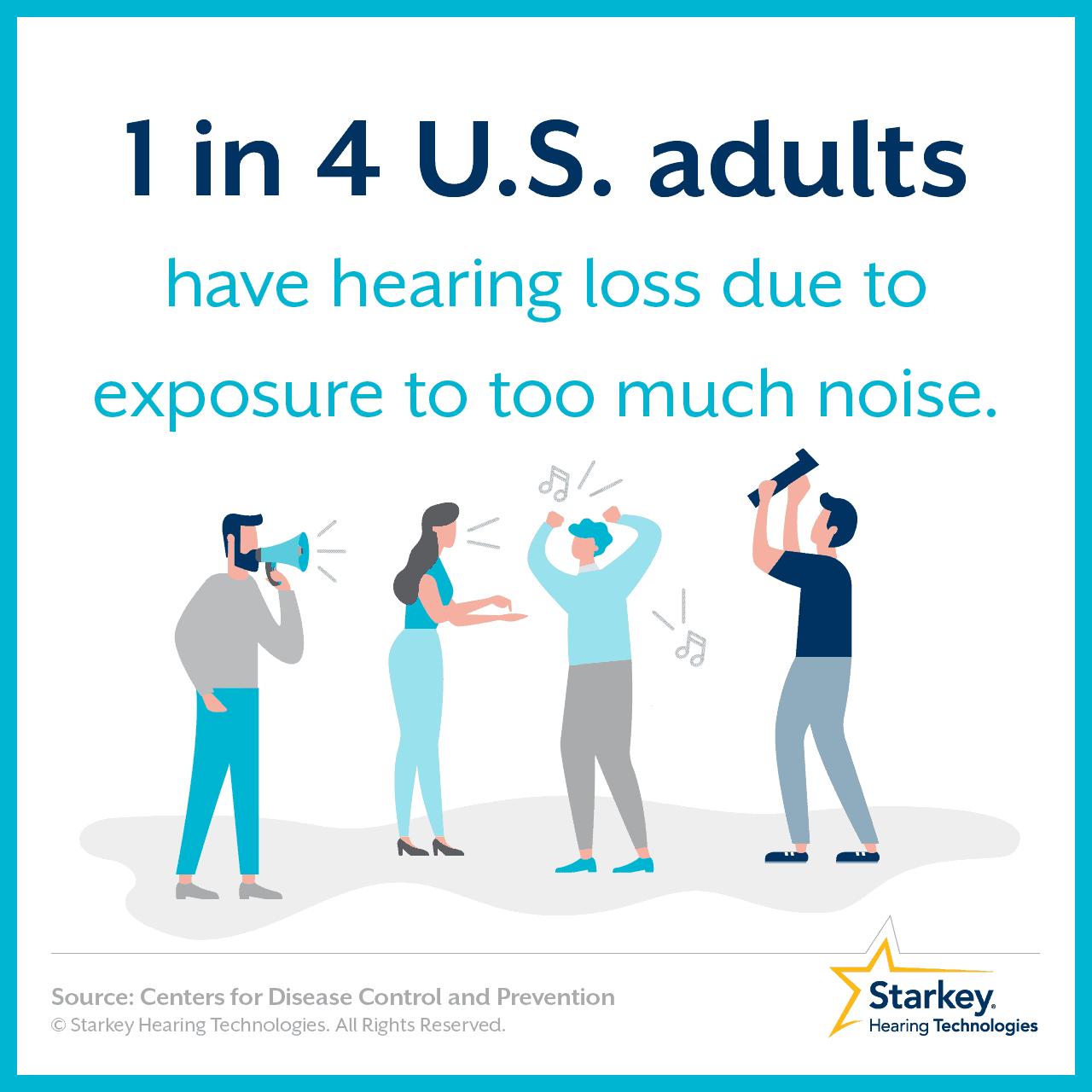
What is noise-induced hearing loss? Every day, we experience sound in our environment, such as the sounds from television and radio, household appliances, and traffic. Normally, these sounds are at safe levels that don’t damage our hearing. But sounds can be harmful when they are too loud, even for a brief time, or when they are both loud and long-lasting. These sounds can damage sensitive structures in the inner ear and cause noise-induced hearing loss (NIHL).
NIHL can be immediate or it can take a long time to be noticeable. It can be temporary or permanent, and it can affect one ear or both ears. Even if you can’t tell that you are damaging your hearing, you could have trouble hearing in the future, such as not being able to understand other people when they talk, especially on the phone or in a noisy room. Regardless of how it might affect you, one thing is certain: noise-induced hearing loss is something you can prevent.
Who is affected by NIHL? Exposure to harmful noise can happen at any age. People of all ages, including children, teens, young adults, and older people, can develop NIHL. Of the roughly 40 million Americans suffering from hearing loss, 10 million can be attributed to noise-induced hearing loss (NIHL).
What causes NIHL?
NIHL can be caused by a one-time exposure to an intense “impulse” sound, such as an explosion, or by continuous exposure to loud sounds over an extended period of time, such as noise generated in a woodworking shop.
Recreational activities that can put you at risk for NIHL include target shooting and hunting, snowmobile riding, listening to MP3 players at high volume through earbuds or headphones, playing in a band, and attending loud concerts. Harmful noises at home may come from sources including lawnmowers, leaf blowers, and woodworking tools.
Sound is measured in units called decibels. Sounds at or below 70 A-weighted decibels (dBA), even after long exposure, are unlikely to cause hearing loss. However, long or repeated exposure to sounds at or above 85 dBA can cause hearing loss. The louder the sound, the shorter the amount of time it takes for NIHL to happen.
Here are the average decibel ratings of some familiar sounds:
- Normal conversation: 60-70 dBA
- Movie theater: 74-104 dBA
- Motorcycles and dirt bikes: 80-110 dBA
- Music through headphones at maximum volume, sporting events, and concerts: 94-110 dBA
- Backpack leaf blowers: 95-115 dBA
- Sirens: 110-129 dBA
- Fireworks” 140-165 dBA
- Firearms: 140-175 dBA
Your distance from the source of the sound and the length of time you are exposed to the sound are also important factors in protecting your hearing. A good rule of thumb is to avoid noises that are too loud, too close, or last too long.
Can NIHL be prevented? NIHL is the only type of hearing loss that is completely preventable. If you understand the hazards of noise and how to practice good hearing health, you can protect your hearing for life. Here’s how:
- Know which noises can cause damage (those at or above 85 dBA).
- Wear earplugs or other protective devices when involved in a loud activity (activity-specific earplugs and earmuffs are available at our office, hardware and sporting goods stores).
- If you can’t reduce the noise or protect yourself from it, move away from it.
- Be alert to hazardous noises in the environment.
- Protect the ears of children who are too young to protect their own. (My neighbor and his 1 year old son now both have earmuffs to wear when they go for rides on the lawnmower.)
- Make family, friends, and colleagues aware of the hazards of noise.
- Have your hearing tested if you think you might have hearing loss. (If you haven’t had your hearing tested recently, now may be a good time for an evaluation).
We offer many types of hearing protection in our office. Give Beth or Jamie a call at (704) 212-2376 to schedule an appointment to determine the best hearing protection for your needs. Be sure to visit our website at www.hearingsolutionsofnc.com. Jane and I look forward to seeing you soon.
